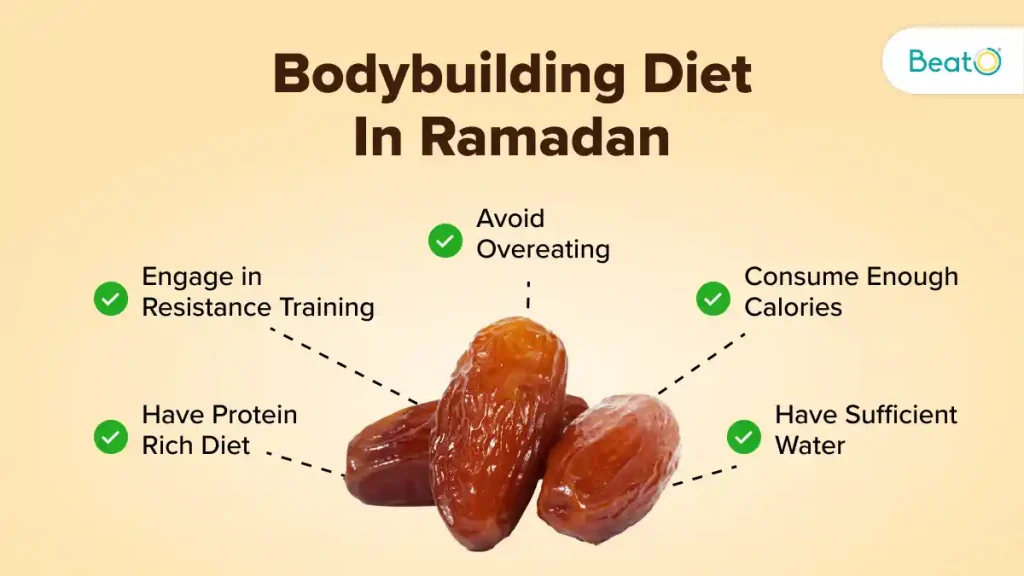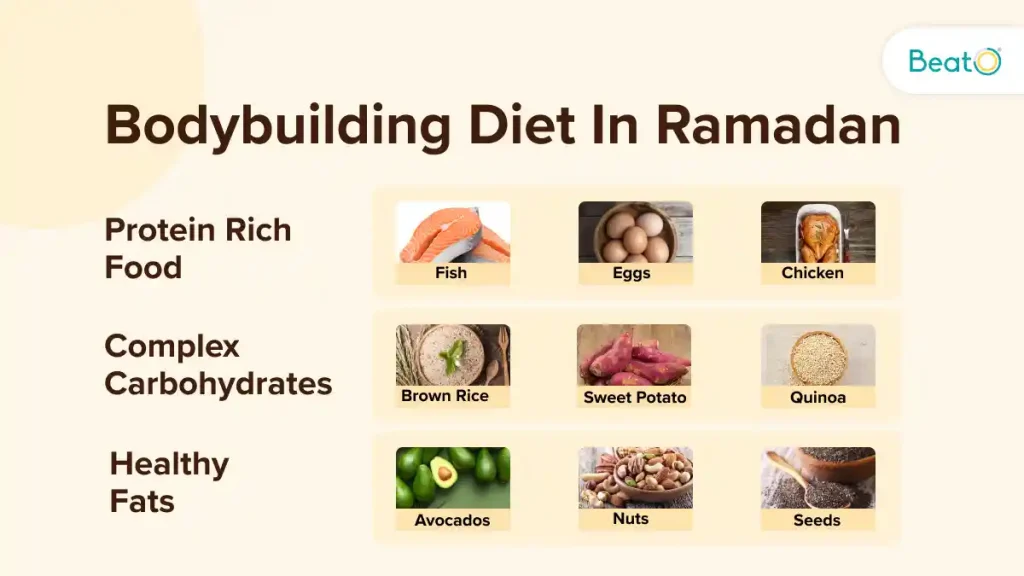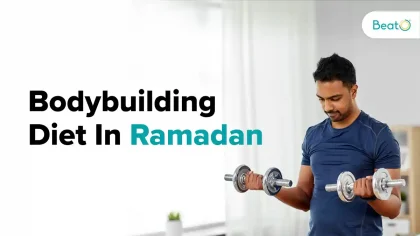Nowadays, all Muslims around the world observe Ramadan. In essence, it entails fasting from dawn until dusk. You can eat after sunset, so it’s essentially intermittent fasting.

Among the most frequent queries from individuals keeping Ramadan is, “Am I going to lose all the muscular mass I’ve gained? What will this fasting accomplish? I don’t want to regain all of my gained muscular mass.” Here we talk about the best bodybuilding diet in Ramadan, your Workout routine and tips to maintain your muscle mass.
Also Read: Debunking Some Common Myths And Misconceptions Of Ramadan Fasting
Bodybuilding Diet In Ramadan and Workout Plan
It can be difficult to maintain a bodybuilding diet in Ramadan, particularly this year as the holy month falls during the hottest part of the summer. Ramadan in the heat means a lengthier fast with smaller meals. You will also find it more difficult to lift weights since you won’t be able to drink water. The shorter nights of summer Ramadan might also cause sleep loss. However, there are a few simple methods to keep bodybuilding and Ramadan in harmony.
Plan Your Meals And Workout
It is advisable to prepare your meals in advance and can be an effective strategy to ensure you’re receiving all the necessary nutrients while working out during Ramadan. However, it’s crucial to pay close attention to the types of food you’re consuming as part of your bodybuilding diet in Ramadan. Remember, the goal is to foster an appreciation for what you have.
For those avid gym-goers observing Ramadan, the best way to move is to set attainable goals. Consider scaling back your normal routine – maybe shorten your sessions. For instance, if you typically work out for an hour, try reducing it to 45 minutes.
Given the fasting period, you might not have the same mental stamina as usual, and the last thing you want is an injury. Decide now when you’ll train – in the morning or after Iftar, and hold yourself accountable by setting a specific time.
Ramadan shouldn’t derail you if your objective is to lose weight. However, it poses a challenge if you want to add, or at least maintain, muscle and strength. Whether you’re bulking or dieting, here’s a bodybuilding diet in Ramadan that you can follow.
Also Read: Ramadan Diet For Weight Loss: Unlocking The Secrets To Shedding Weight While Fasting
Fasting And Muscle Building

Gaining muscle is a challenging enough task. Attempting to do so while observing an 11–18 hour daily fast? Let’s just say that sets a higher standard. Your primary focus should be on maintaining your strength and muscle mass as much as possible during the month of Ramadan. I promise that even that will need effort.
You must both consume enough calories and engage in resistance training to stimulate muscle growth to gain or maintain muscular mass. This goal is made significantly more difficult by going for extended periods without eating, especially protein.
Fortunately, when using the right diet and exercise techniques to maximise muscle maintenance, numerous studies conducted on healthy, athletic individuals have not demonstrated any appreciable loss of muscle mass.
Also Read:A Comprehensive Guide On How to Control Diabetes
Fasting And Fat Loss
Are you looking for an unbeatable fat loss recipe? Prepare to lose when you combine the daily fasting of Ramadan with an almost certain calorie deficit. Although it’s still feasible, overeating is much more difficult when you have a lot less time. However, intermittent fasting unintentionally establishes a useful framework for controlling your calorie intake. Furthermore, extended fasting lowers insulin levels, which makes the body more dependent on fat for energy. If there’s ever a winning weight loss combo, that’s it!
Use cardio training and schedule it well to maximise your fat-loss efforts. Researchers looked at the effects of aerobic exercise on participants during Ramadan in a study that was published in the Journal of Sports Sciences. Just before the meal window, half of the patients exercised while fasting, while the other half exercised four hours later, or essentially in the middle of the night. When participants in the aerobic exercise were fasting rather than eating, the researchers observed a higher reduction in body fat in the fasting group.
Also Read: Essential Post Running Stretches Every Runner Needs In Their Routine
Bodybuilding Diet In Ramadan: What to Eat?

During Ramadan, Muslims abstain from eating or drinking from dawn until sunset. This could be up to 16 hours without food or water, depending on your geographical location. This means that your eating window is limited, and you need to make the most of it.
1. Pre-Dawn Meal (Suhoor)
Suhoor is the meal consumed early in the morning before fasting begins. It’s crucial to make this meal count as it will fuel your body for the majority of the day.
Protein: Prioritise lean protein sources like chicken, turkey, fish, eggs, or plant-based proteins like lentils and chickpeas. Protein is vital for muscle repair and growth.
Complex Carbohydrates: Complex carbs such as brown rice, sweet potatoes, oats, whole grain bread, and quinoa are slow-digesting, providing a sustained energy release throughout the day.
Healthy Fats: Avocados, nuts, seeds, and olive oil provide essential fatty acids and additional calories needed for bodybuilding.
Hydration: Drink plenty of water. You can also consume fruits and vegetables with high water content for additional hydration.
Also Read:10 Health Benefits of Walking Everyday
2. Breaking The Fast (Iftar)
Iftar is the meal that breaks the fast at sunset. It’s important to replenish your body with the right nutrients after a long day of fasting.
Dates and Water: Traditionally, fast is broken with dates and water. Dates provide an immediate energy boost due to their natural sugars, while water rehydrates your body.
Protein and Carbs: After breaking the fast, consume a proper meal rich in protein and carbs. This could be grilled chicken with brown rice, fish with sweet potatoes, or lentil curry with whole grain bread.
Vegetables: Don’t forget to include a variety of colourful vegetables for added fibre and essential vitamins and minerals.
3. Post-Workout Nutrition
If you prefer to workout after Iftar, make sure to nourish your body post-workout. A protein shake combined with a banana or other high-glycemic fruit can be a great bodybuilding diet in Ramadan as it replenishes glycogen stores and kickstarts muscle recovery.
Also Read: Unique Sources of Protein to Explore
Conclusion
It’s important to enter Ramadan with the right mindset. While it’s true that you might lose weight, remember that isn’t the primary objective. Enjoy this journey. Ramadan is a time of celebration, a time for acknowledging our blessings, and no matter where we are in life, we always have reasons to be grateful.
Disclaimer: The content of this article is compiled information from generic and public sources. It is in no way a substitute, suggestion, or advice for a qualified medical opinion. Always consult a specialist or your own doctor for more information. Beato App does not claim responsibility for this information.
Are you looking for the perfect glucometer to check your blood sugar level? Try out BeatO smartglucometerkit, affordable and easy to use.
Discover top-tier diabetes care with BeatO’s Chief Clinical Officer,Dr. Navneet Agarwal. His expertise in Diabetes ensures personalised guidance for overall health. Try out a smartglucometerand keep track of blood sugar levels now.




